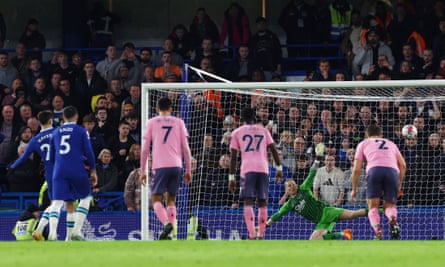Heroes come sometimes in unlikely forms. Ellis Simms has been a forlorn figure since returning to Goodison Park from his loan spell at Sunderland, but he came off the bench to score an equaliser that at least lifted Everton a point clear of the relegation zone, even if they remain fourth bottom. It’s so tight in the bottom half, though, that a win would have lifted them to twelfth.
Simms had scored seven goals in 17 games on loan at Sunderland earlier in the season before being recalled by Frank Lampard shortly before he was sacked.
The one real opportunity Sean Dyche had given him was away at Liverpool, when he was asked to play a lone strike role that really didn’t suit him. Big he may be, but chasing lost causes is not his style. Here he showed what he can do with players near him, picking up the ball on the left, drifting infield, and finishing via Kepa Arrizabalaga’s hand. As such, this joined the lengthy list of Chelsea games this season that they have dominated but failed to win.
In Enzo Fernández and João Félix, Chelsea have two players of immaculate touch. They’re always on the half-turn, capable of finding space where none seems to exist, both blessed with a remarkable range of passing.
Add in the deft talents of Kai Havertz and Mateo Kovacic and it’s perhaps not surprising if there are times when they seem almost beguiled by their own virtuosity, creating gorgeous networks of passes that often end up, 30 seconds or a minute after they began, back where they started.
That can be useful in breaking an opponent down, making them chase until the process of attrition generates chances, but if the failure of Graham Potter sides to score as many goals as it feels they ought to is down to anything beyond the absence of a bona fide number 9, it is probably that.
How do I sign up for sport breaking news alerts?
Show- Download the Guardian app from the iOS App Store on iPhone or the Google Play store on Android by searching for 'The Guardian'.
- If you already have the Guardian app, make sure you’re on the most recent version.
- In the Guardian app, tap the Menu button at the bottom right, then go to Settings (the gear icon), then Notifications.
- Turn on sport notifications.
This for long spells fell squarely into the familiar pattern of Chelsea recently, dominating possession without creating clear goalscoring opportunities, something in which they weren’t helped by Everton’s deep-lying defence, guarded by the new dogs of war trio of Abdoulaye Doucouré, Idrissa Gana Gueye and Amadou Onana in central midfield.
Everything João Félix does is elegant. He slid to keep the ball in play by the touchline and somehow managed to control his spin on the grass to ascend with the ball at his feet. One turn past James Tarkowski had an air of Dennis Bergkamp.
Even when he skewed a cross over the bar and ended up glaring remorsefully at his errant right foot, he managed somehow to imbue the act with a sense of class. This wasn’t a mistake like another player might make: it was a meditation on the inevitability of human fallibility.
Tarkowski’s response was rather less high-falutin, grabbing João Félix round the throat next time he got the chance; the sort of off-the-ball incident that a more enlightened implementation of VAR might be able to eradicate.
But this wasn’t about the minutiae of refereeing – very few games are – it was about the far more fundamental question that has been asked for so long by so many different people in the south of England that it’s begun to see one of the most profound questions of the age: why is it that Potter teams score so few goals?
after newsletter promotion
Almost nothing in football, though, has just one answer. The Potter Conundrum intersects with a feature of Chelsea that long pre-dates him, which is that they are extremely reliant on the wing-backs for penetration. Before Saturday, Chelsea had won 63% of games when Reece James and Ben Chilwell have both played this season as opposed to 36% when they do not.

When Chelsea finally managed their notable chance, four minutes after half-time, it was Chilwell’s cross that led to Havertz’s downward header that Jordan Pickford saved.
And Chilwell was a crucial link in the goal that broke the deadlock after 52 minutes. Fernández’s sweeping pass created the space, putting Michael Keane on the back foot so that when Chilwell squared, he scuffed his clearance.
João Félix didn’t catch his finish cleanly either but he is such a naturally graceful player that there was still something aesthetically pleasing anyway in the way the ball trickled in off the far post, Everton players strewn about its path.
Everton’s threat, such as it was, was confined largely to set plays and, sure enough, that’s how they found their equaliser, Doucouré flicking in after Tarkowski had headed back across goal. But it didn’t take long for Chelsea’s wing-backs to cut through again, James tripped by a combination of Ben Godfrey and Tarkowski to earn a penalty that Havertz converted. But Simms ensured it was not the winner it had appeared.

 1 year ago
55
1 year ago
55










 English (US)
English (US)